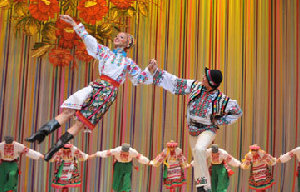Mandarin makes its voice heard in South Africa
Despite the fact that English is recognized as the language of politics, business and science, it ranked fourth and was spoken by only 9.6 percent of South Africans at home in 2011, according to the census released by Statistics South Africa in 2012.
"In the beginning, teaching Chinese in this multilingual environment was really tough,'' Wu said.
"People who are proficient in English have a better understanding of the course content as it is taught in English."
Wu later realized the course instructor should have the ability to communicate with students in more local languages such as Zulu and Sotho - two languages spoken by 40 percent of the country's population - to make them learn Chinese in a flexible way.
"Another challenge is that Chinese characters are symbols and students have difficulties comprehending and remembering them, because they have been reading and writing words in letters for years," he says.
Wu, aiming to let more people discover the richness of Chinese and its culture, has been studying Zulu for more than six months to improve his interpretation skills between Chinese, English and Zulu.
"For us, having a certain knowledge of widely-spoken languages will not only help us teach students in an efficient way, but can also create a new teaching path under such a multicultural background," Wu said.
Wu also teaches short-term classes to adults who want to travel or do business in China. The six-week course is designed to enable students to acquire basic written and oral competence in Chinese to greet people, introduce themselves, understand short descriptive sentences, and read and write short simple texts.
Wu has started to recruit more qualified lecturers and university volunteers from China to teach Chinese in three nearby middle schools.
Diversified methods
In addition to establishing 29 Confucius Institutes and classrooms in 22 African countries, the Chinese language and culture provider has also diversified its teaching methods in South Africa.
Wang Yuchen, director of the Confucius Institute at Tshwane University of Technology, said that supported by Hanban, the Confucius Institute at the university has partnered with the Southern African-China Science, Engineering & Technology and Education Association to launch a half-hour daily on-air Chinese classroom in West Pretoria in 2012.
This radio program covers Chinese language, cultural trends, history, customs, calligraphy, dialects, Chinese tea drinking habits, ancient stories and the annual Hanyuqiao competition, a project promoting Chinese language and culture overseas. The program includes information on scholarships the Chinese government is offering to South African students this year.
"More than 530 students and local residents have registered with this on-air classroom. We are also working with other South Africa-based Confucius Institutes to attract more students to participate in this program via multimedia platforms," Wang said.
"One sign of this trend is that more Chinese companies, such as Lenovo, Huawei Technologies and StarTimes, are determined to further engage with all sorts of business opportunities in South Africa. People here have realized that they cannot communicate with Chinese directly. Thus the demand for learning Chinese has remained high."
Wang said if graduates can speak fluent Chinese they have more chance of finding decent jobs in South Africa's service and tourism sectors, because 100,000 Chinese tourists chose South Africa as their travel destination in 2012, according to the Department of African Affairs at China's Foreign Ministry.
Related:
|
|
|
| Gung ho about ketchup and other Chinese words | Ukraine kicks up its heels in China |
Moscow residents learn Chinese language, culture at new center
























